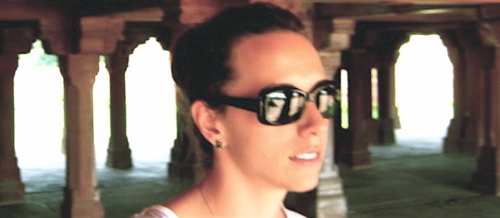Justyna Janik: Unsanctioned Writing from the Middle East
by Sampsonia Way / February 19, 2013 / No comments
Nowhere Near a Damn Rainbow: Unsanctioned Writing from the Middle East is an anthology of work from 31 poets who are part of the poetry collective known as the Poeticians.
Sampsonia Way asked Hind Shoufani, founder of the Poeticians and curator of the book, to pick eight writers to be interviewed. In this series we present those poets’ voices and publish a poem from each.
The writer profiled in our fifth installment is Justyna Janik, a poet originally from the Poland who now lives in Canada, and allowed us to publish her poem “America.”

Justyna Janik, a Polish-Canadian poet, found her inspiration in Middle Eastern culture and daily life. Photo: Justyna Janik.
- Justyna Janik
- Justyna Janik is a Polish-Canadian poet who has been writing since childhood, though her poetry, written over the last three years, has found its first home in the Poeticians community. Janik is heavily inspired by the Middle Eastern region and has lived and worked there for over three years. Currently, she lives in Toronto and works in logistics.
Your poem “America” is about America’s food culture, a lighter topic than your other poems in the book. Why did you decide to write about that?
I wrote this poem when visiting North America while still living in Dubai. I was trying to convey the dichotomy between the freedom of multiculturalism and cultural value. Food is what came to mind to express that. North America is very unique in the diversity of cultures that are present and openly expressed there. This, at first glance, is amazing and enriching, but also very misleading. It contains a mix of cultures, but as a result there is a cheapening effect.
For example, Souvlaki are flavorful because they are cooked slowly, not fast; pizza is tasty when it’s thin, not thick; Chinese food is as much steamed as it is fried. This cultural mix has somewhat cheapened the core values of these foods, but they are still openly available. At the time of writing, and even now, I’m not sure if openness can be reconciled with due respect, depth, and meaning. Perhaps this is why I have a hard time identifying as Polish-Canadian.
What is the importance of the Poeticians to you?
The Poeticians made me take my writing seriously. It made me believe my writing could mean something to someone other than myself and that I had an interesting perspective to share. For this I am ever grateful to Hind Shoufani particularly, and all the Poeticians generally. It is something I will always remember about the Middle East.
Nowhere Near A Damn Rainbow highlights that it’s an uncensored book of “unsanctioned” writing. How have you benefited from being in an uncensored collection?
I got to be published alongside some controversial stuff. I’m usually not so controversial.
Can you talk about freedom of speech in the United Arab Emirates? Which topics weren’t you allowed to discuss?
When I lived in the UAE there was a long list of topics I, as a foreigner, should probably never speak of, or publish publicly, including: Human rights, treatment of foreign laborers, religion, politics, and sex. The consequences would probably be deportation, or fines, or imprisonment. That being said, you need to be noticed by the authorities first, and be considered a serious enough threat, before you should realistically worry about it. But for the most part, Dubai is a public relations machine. It would probably be more damaging for the UAE to deport lonely, insignificant poets than to let them have their five minutes on the mic at the Poeticians reading.
What misunderstandings does the West have about Middle Eastern literature?
I’m not sure how much the West knows about Middle Eastern literature, other than the Qur’an and Arabian Nights. To be honest, I only became acquainted with Arab writers while I was in the Middle East. So far I only know poets like Mahmoud Darwish, Nizar Qabbani, Adonis, and Taha Muhammad Ali. However, from my experience with the Poeticians I would say that modern Arab writers are feisty and as comfortable writing in English as in Arabic.
You were born in Poland, now live in Canada, and spent three years working and living in the Middle East. How do you define yourself in terms of nationality?
This is a problem. The easy answer is Polish-Canadian, but I’m not comfortable with it. This dual nationality thing doesn’t mean anything, especially if you have lived in four other countries along the way. I’m still working on a definition.
What are you working on now?
Trying to write stuff that’s a bit less personal. I work full-time and also paint, so I’m increasingly struggling for time, but I’m still trying.
AMERICA
Oh America!
You can make souvlaki, fast
and shawarma, fast
and pizza, thick
and Chinese, greasy
and I don’t know if I should love
or hate
this fast-food democracy.




